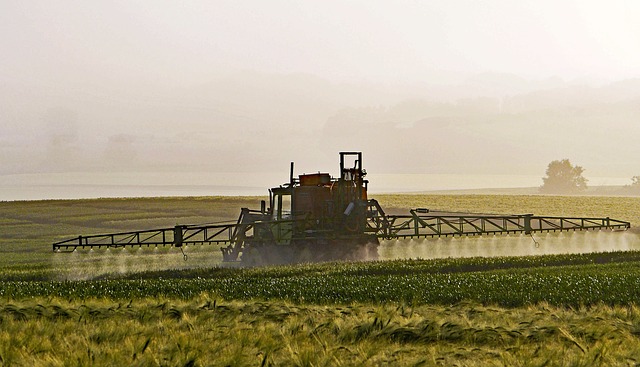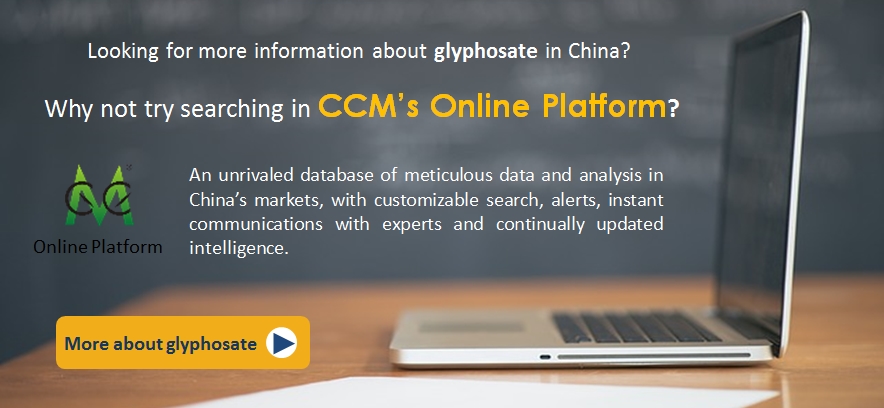Glyphosate is still China's herbicide with the largest market share. However, bad news
about human and environmental toxicity, as well as a rising number of resistant
weeds have damaged the reputation. In the meanwhile, another herbicide is on
its way to the top in China. glufosinate-ammonium is marked by several beneficial factors, which may elevate this herbicide as
the biggest competitor to glyphosate.

Source: Pixabay
According
to market intelligence firm CCM,
glufosinate-ammonium is on the way to becoming the strongest competitor for
glyphosate in China. Four main factors are leading the remarkable trend of
glufosinate-ammonium in China, which have been analysed by CCM. The four
factors are a significantly increasing registration number of
glufosinate-ammonium in China, the rising number of manufacturers for this
pesticide, a falling price trend is supporting market share, and finally
China’s farmers are broadly accepting this herbicide on their farms.
Registrations
China’s
number of glufosinate-ammonium registrations is rising. At the end of March,
the total number of valid registrations already counted 237. This amount is
divided into 8 TK, 37 TC, and 192 glufosinate-ammonium formulations.
Looking
at the registrations for glufosinate-ammonium TK, the amount has been rising
continuously from 2009 to 2016. Only the year 2013 was standing out with a
large number of 13 registrations, compared to one registration in 2009 and 8 in
2016.
Glufosinate-ammonium
TK, on the other hand, has not seen any high fluctuations in registration
during the past years. That is mainly due because there have been only 8
registrations at all.
The
registration amount of formulations was the one with the largest increase
during the last years. When in 2009, there have been only 2 new registrations,
the number rose until 52 new registrations in 2016 and already 20 new in the
beginning of 2017.
Notably,
Bayer CropScience is the only foreign company with registrations for all three
types. Syngenta has registrations for formulations as well.
The
application area for glufosinate-ammonium, furthermore, is spreading. Besides
the usage of non-cultivated land, the pesticide can also be used on tea
gardens, citrus orchards, coffee farms, banana fields, vineyards, vegetable
fields, and papaya orchards, according to CCM’s research.
Manufacturers
The
glufosinate-ammonium capacity has surpassed 30,000 tonnes per year. This
significant growth is mainly due to increased efforts of more players in this
industry to take part in the production. The two companies YONON and
Lier Chemical are the leading producers currently with an annual production of
5,000 tonnes each. Lier Chemical even plans to increase the capacity to 10,000
tonnes in 2017.
However,
even this amount will be surpassed by Sichuan Fuhua Agro-chemical, which is
working on a project that will enable a production of 12,000 tonnes after the
completion in next years. Other companies, like Jiaruimi Fine Chemical, Hebei
Veyong Bio-Chemical, and Shijiazhuang Richem are also working on new
production lines and expansions, to reach capacities of 600 t/a, 3,000 t/a, and
1,000 t/a respectively.
Price
The
price of glufosinate-ammonium is marked by a constant fall since the year 2014.
While in 2015 the price showed an average of USD44,160 per tonne, it fell down
rapidly to USD20,190 per tonne in 2016. Looking at the increasing number of
players joining the industry, the price is very likely to keep falling down to
some extent, which increases the demand even further.
Farmers
With
the high promotion of glufosinate-ammonium in recent years, the acceptance by
Chinese farmers for glufosinate-ammonium is getting higher, which can be seen
in China’s glufosinate-ammonium manufacturers’ performance. CCM has picked the
leading companies Lier Chemical and YONON as representatives.
According
to the 2016 financial figures of Lier Chemical, the pesticide sales have been
USD287.65 million, up by 34.76% YoY, which should give the credit to the good
sales of glufosinate-ammonium TC and formulations in 2016.
Experts
say that YONON’s efforts have gained an annual sale of over USD14.54 million.
The company introduced the first glufosinate ammonium formulation in 2007,
which made it to the first producer in China. The first efforts were focusing
on producing samples and train farmers on this new pesticide. By the year 2010,
the sales volume only in China’s Guangdong province surpassed already 70
tonnes, exceeding to 300 tonnes worldwide in 2011. The significant success led
to the great sales volume nowadays and has enabled a leading role of
glufosinate-ammonium in China’s market.

The
bespoke four factors are the reasons, why glufosinate-ammonium is likely to
become a dangerous rival for glyphosate in China.
Glyphosate
itself is showing some weaknesses. In general, weeds are easy to become
resistant to a herbicide that has been used alone for 3-5 years. Therefore,
weeds are showing serious resistance to glyphosate as it has been used for
decades. Currently, some weeds like mazus japonicus, common
dayflower, youngia japonica, purslane, cudweed herb, copperleaf,
field bindweed and endive are largely insensitive to glyphosate. As a result,
using glyphosate formulations alone cannot effectively control and
prevent them.
In
fact, when glufosinate-ammonium was promoted in the market, the huge price gap
between it and glyphosate was there. On the other hand, being marketed for many
years, glyphosate has been accepted broadly by farmers. Therefore, this will be
still an obstacle for the promotion of glufosinate-ammonium.
Glufosinate-ammonium
Glufosinate-ammonium
is a herbicide, which is used to control weeds in over 100 different crops.
Farmers are using glufosinate-ammonium mainly, because it is known to
have a good degree of crop safety, as it only affects the parts of the plant
where it is applied. The pesticide is useable against a wide range of weeds.
Its unique mode of action makes it ideal to be used in rotation with other
herbicides to mitigate weed resistance.
About CCM
CCM
is the leading market intelligence provider for China’s agriculture, chemicals,
food & ingredients and life science markets.
Do
you want to find out more about the glyphosate market in China? Try our
Newsletters and Industrial Reports or join our professional online platform today and get insights in Reports, Newsletter, and Market Data at one place.
For
more trade information of pesticide products, including Import and Export
analysis as well as Manufacturer to Buyer Tracking, contact our experts in trade analysis to get your answers today.
Looking
for a convenient way to get comprehensive and actual information as well as a
platform to discuss with peers about the latest agrochemicals industry and
market trends? Simply subscribe to our YouTube Channel and join our groups on LinkedIn and Facebook.